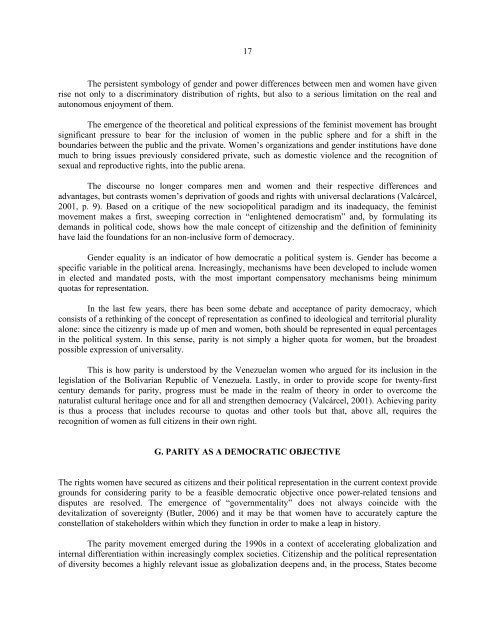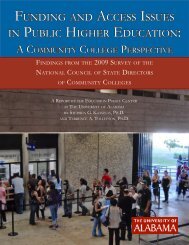Women in Latin America and the Caribbean - Cepal
Women in Latin America and the Caribbean - Cepal
Women in Latin America and the Caribbean - Cepal
You also want an ePaper? Increase the reach of your titles
YUMPU automatically turns print PDFs into web optimized ePapers that Google loves.
17<br />
The persistent symbology of gender <strong>and</strong> power differences between men <strong>and</strong> women have given<br />
rise not only to a discrim<strong>in</strong>atory distribution of rights, but also to a serious limitation on <strong>the</strong> real <strong>and</strong><br />
autonomous enjoyment of <strong>the</strong>m.<br />
The emergence of <strong>the</strong> <strong>the</strong>oretical <strong>and</strong> political expressions of <strong>the</strong> fem<strong>in</strong>ist movement has brought<br />
significant pressure to bear for <strong>the</strong> <strong>in</strong>clusion of women <strong>in</strong> <strong>the</strong> public sphere <strong>and</strong> for a shift <strong>in</strong> <strong>the</strong><br />
boundaries between <strong>the</strong> public <strong>and</strong> <strong>the</strong> private. <strong>Women</strong>’s organizations <strong>and</strong> gender <strong>in</strong>stitutions have done<br />
much to br<strong>in</strong>g issues previously considered private, such as domestic violence <strong>and</strong> <strong>the</strong> recognition of<br />
sexual <strong>and</strong> reproductive rights, <strong>in</strong>to <strong>the</strong> public arena.<br />
The discourse no longer compares men <strong>and</strong> women <strong>and</strong> <strong>the</strong>ir respective differences <strong>and</strong><br />
advantages, but contrasts women’s deprivation of goods <strong>and</strong> rights with universal declarations (Valcárcel,<br />
2001, p. 9). Based on a critique of <strong>the</strong> new sociopolitical paradigm <strong>and</strong> its <strong>in</strong>adequacy, <strong>the</strong> fem<strong>in</strong>ist<br />
movement makes a first, sweep<strong>in</strong>g correction <strong>in</strong> “enlightened democratism” <strong>and</strong>, by formulat<strong>in</strong>g its<br />
dem<strong>and</strong>s <strong>in</strong> political code, shows how <strong>the</strong> male concept of citizenship <strong>and</strong> <strong>the</strong> def<strong>in</strong>ition of fem<strong>in</strong><strong>in</strong>ity<br />
have laid <strong>the</strong> foundations for an non-<strong>in</strong>clusive form of democracy.<br />
Gender equality is an <strong>in</strong>dicator of how democratic a political system is. Gender has become a<br />
specific variable <strong>in</strong> <strong>the</strong> political arena. Increas<strong>in</strong>gly, mechanisms have been developed to <strong>in</strong>clude women<br />
<strong>in</strong> elected <strong>and</strong> m<strong>and</strong>ated posts, with <strong>the</strong> most important compensatory mechanisms be<strong>in</strong>g m<strong>in</strong>imum<br />
quotas for representation.<br />
In <strong>the</strong> last few years, <strong>the</strong>re has been some debate <strong>and</strong> acceptance of parity democracy, which<br />
consists of a reth<strong>in</strong>k<strong>in</strong>g of <strong>the</strong> concept of representation as conf<strong>in</strong>ed to ideological <strong>and</strong> territorial plurality<br />
alone: s<strong>in</strong>ce <strong>the</strong> citizenry is made up of men <strong>and</strong> women, both should be represented <strong>in</strong> equal percentages<br />
<strong>in</strong> <strong>the</strong> political system. In this sense, parity is not simply a higher quota for women, but <strong>the</strong> broadest<br />
possible expression of universality.<br />
This is how parity is understood by <strong>the</strong> Venezuelan women who argued for its <strong>in</strong>clusion <strong>in</strong> <strong>the</strong><br />
legislation of <strong>the</strong> Bolivarian Republic of Venezuela. Lastly, <strong>in</strong> order to provide scope for twenty-first<br />
century dem<strong>and</strong>s for parity, progress must be made <strong>in</strong> <strong>the</strong> realm of <strong>the</strong>ory <strong>in</strong> order to overcome <strong>the</strong><br />
naturalist cultural heritage once <strong>and</strong> for all <strong>and</strong> streng<strong>the</strong>n democracy (Valcárcel, 2001). Achiev<strong>in</strong>g parity<br />
is thus a process that <strong>in</strong>cludes recourse to quotas <strong>and</strong> o<strong>the</strong>r tools but that, above all, requires <strong>the</strong><br />
recognition of women as full citizens <strong>in</strong> <strong>the</strong>ir own right.<br />
G. PARITY AS A DEMOCRATIC OBJECTIVE<br />
The rights women have secured as citizens <strong>and</strong> <strong>the</strong>ir political representation <strong>in</strong> <strong>the</strong> current context provide<br />
grounds for consider<strong>in</strong>g parity to be a feasible democratic objective once power-related tensions <strong>and</strong><br />
disputes are resolved. The emergence of “governmentality” does not always co<strong>in</strong>cide with <strong>the</strong><br />
devitalization of sovereignty (Butler, 2006) <strong>and</strong> it may be that women have to accurately capture <strong>the</strong><br />
constellation of stakeholders with<strong>in</strong> which <strong>the</strong>y function <strong>in</strong> order to make a leap <strong>in</strong> history.<br />
The parity movement emerged dur<strong>in</strong>g <strong>the</strong> 1990s <strong>in</strong> a context of accelerat<strong>in</strong>g globalization <strong>and</strong><br />
<strong>in</strong>ternal differentiation with<strong>in</strong> <strong>in</strong>creas<strong>in</strong>gly complex societies. Citizenship <strong>and</strong> <strong>the</strong> political representation<br />
of diversity becomes a highly relevant issue as globalization deepens <strong>and</strong>, <strong>in</strong> <strong>the</strong> process, States become











